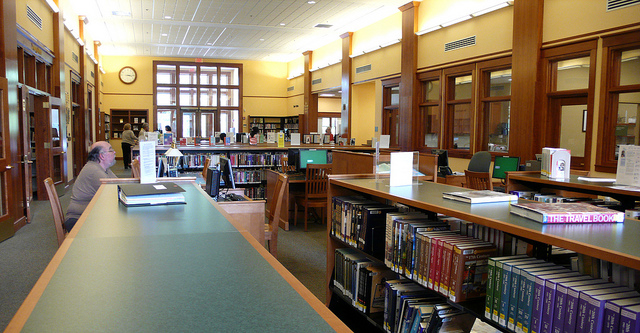My second grader had to do a report for school, her first substantive project she has had to do in the Age of Digital. Her work effort was to take the form of hand-drawn artwork on a poster board and, thanks to technology, a one minute video presentation.
She selected Babe Didrikson Zaharias, universally accepted as one of the greatest female athletes of all time. So when the handoff was made from teacher to parent, I was excited to be a part of it.
When we sat down to start, my daughter immediately pointed out that she had already “looked up” Babe, which I took to mean started to research her historical figure. “Did you go to the library?” I asked. “The library at school?” she responded. “Yes, did you go to the library at school for your project?” “Yes, Dad, of course, that’s where the computers are.”
Do libraries exist? I get that they physically exist in schools and towns across America, in fact there is a big one in my town, coincidentally off of Main Street. But do they conceptually exist? Are they relevant? Did it all fall apart in 1995? The sanctuary of the library dates back over 2000 years, serving a community’s seekers of knowledge and entertainment and escape through the organized collection of information- that is books- prepared presumably by smart and learned authors. Now it appears the library is as antiquated as the VHS and Walkman.
So I guess kids logically turn to the Internet for the answers. I asked my mom, the recently retired teacher of almost 30 years, what we did for MY second grade report. She first mentioned some thing called a set of encyclopedias that I guess we kept on a book shelf in the house. Hmmmmm. But then she said we would “go to the library”. And “go” meant getting in the car, finding a parking spot, returning old books, thumbing through the card catalog, walking the shelves, checking books out, and taking them home to read.
Ah, reading. I read books to learn when I was young. It was all coming back to me. Why don’t kids in the Digital Era get that? I mean, to this very day, I read, ALL the time. I read my CNN via my iPhone on my commuter train in the morning. I read ESPN.com like 5 or 6 times a day to make sure I’m abreast of the latest in sports. For work, I easily read an article or blog or both a day when I Google something I am need or want to learn about. And, I must read 100 texts a day. Kids today…
Back to Babe. I chose to let my daughter lead the way for her report. It was apparent that she had indeed “looked up” Babe. She could spout off 7 facts about her as if taking a test. I said “Where did you learn that?” She said “I’ll show you.” We then walked over to our computer and she navigated her way to her school’s site, then clicked here and there and entered her user name and password to get to a list of links to school-approved education-based Web sites, then clicked on the one she needed. And there it was, a 7 screen slideshow of Babe, and those 7 facts front and center. “Oh, and type in Wikipedia, too” she said.
Ah, Wikipedia, the beacon of all truth and knowledge. The answer. The be all end all. The silent killer of libraries as we knew them. Who needs researchers, scholars, academics, Nobel Prize contributors, copywriters, and editors to fill the pages of an Encyclopedia Brittanica when we have you, me, and anyone else who can contribute to Wikipedia our version of what a definition of something is. In fact, as of 2010, Encyclopedia Brittanica doesn’t feel the need to print versions of its work anymore after 300 plus years of annual editions. (Of note, this is not an indictment of Wikipedia, I too end up there all the time to “get the answer.”
This is merely a statement of the world in which knowledge is possibly provided by lay people and generally accepted to be true by those consuming it via scrolling rather than turning pages). One thing for sure, 100,000,000 people a month (that’s the trending number of visits) sure need Wikipedia.
Thanks to Wikipedia and the .Edu site, and a little love from Google Images, my daughter’s report turned out great. The 7 facts appropriately filled the outline that served as the talking points for her video. Her poster was inspired by the on screen collage that resulted from our “Babe Didrickson” search in Google. And the Digital icing on the cake was seeing my daughter’s presentation on the Digital whiteboard at Open House, cued up by her double tapping her name on the screen to stream the video file.
That was cool by the way. So maybe this Digital Era isn’t so bad after all… Having now experienced my child’s first real school project as a parent in the Digital Age, I can tell you for sure, she is Wikipedia smart.
In the continued battle of Dad (and Mom) versus Digital Devices, I think Digital ruled the day on this one. I accept that we accomplished the task at hand, rather expeditiously thanks to the Web. But did we cheat the process? What could have been a physical and intimate visit to the library as parent and child on a mission of learning was merely a 10 foot walk to the computer in our house. My wife and I are not willing to concede the journey of earning knowledge simply because of the ease of accessing knowledge; at least we intend to go down fighting. And because I was complicit in taking the easy road to learning about Babe, I felt the need to order my daughter a book about her, from Amazon of course. And the good thing is that I didn’t have to waste any of my Saturday getting in a car and driving to a bookstore, let alone go to the library, to get it.
Posted on 4/2/2014
Matthew J Beshear is a Dad. And a husband, too. And along with his wife, they struggle each day to find the balance for their children between an ever evolving world of digital, devices, technology, and instant gratification and breathing fresh air, interacting with other humans, and having conversations with family when going out to dinner.














Leave A Comment
You must be logged in to post a comment.